Real Estate Tokenization in Japan: Revolutionizing Property Investment Through Blockchain
Japan’s $20 trillion property market is going digital. With over 70 tokenized real estate offerings since 2021, clear FSA rules, and secondary trading in Osaka, blockchain is lowering barriers for both local and global investors — sometimes to just a few hundred dollars.

Real estate tokenization means turning ownership of property into digital tokens on a blockchain, so people can invest in pieces of buildings or funds without huge amounts of cash or complex paperwork. Japan’s property market – worth around $20 trillion – is one of the world’s largest, yet it has traditionally been hard for outsiders to access due to strict regulations and high barriers. Now, Japan is leveraging blockchain to open up this market, allowing both local and foreign investors to participate more easily than ever before. This article provides an overview of real estate tokenization in Japan, explaining why it’s happening, how it works, and what progress has been made so far.
Why Tokenize Real Estate in Japan?
Japan’s real estate sector is enormous and historically dominated by domestic players. For a long time, foreign buyers made up under 5% of property purchases in Japan. Several factors kept overseas and smaller investors out: complex legal procedures, language barriers, high transaction costs, and opaque ownership structures. Even many Japanese retail (everyday) investors found it difficult to invest in large real estate deals, which were typically reserved for institutions or wealthy individuals.

Tokenization offers a potential solution to these problems. By converting property ownership rights into digital tokens recorded on a blockchain, Japan can lower entry barriers for investors. For example, instead of needing millions of dollars to buy an entire building, an investor could purchase a token representing a tiny fraction of that building’s value. This fractional ownership reduces minimum investment sizes dramatically, making real estate accessible to people who could never afford a whole property. A token can act like a digital share of a building, meaning many people can each own a small part rather than one owner holding it all. This opens the door for everyday investors to get a stake in prime real estate markets like Tokyo and Osaka.
Another big motivation is attracting global capital. Japan’s property market has been attractive (stable rental yields, etc.), but overseas investors often stayed away because of the red tape. Tokenization is seen as a way to dismantle those barriers and enable seamless international participation. Digital tokens can be traded and transferred easily across borders using blockchain, without the need for the full traditional process of registering deeds or hiring local lawyers for each transaction. As one recent report explains, a blockchain-based system can “eliminate longstanding barriers” for foreign investors by cutting out much of the cost and paperwork. In short, tokenization is a tool for making Japan’s real estate market more inclusive – both for small domestic investors and for interested buyers around the world.
Clear Regulations and Strong Support

One reason real estate tokenization is taking off in Japan is the clear legal framework that the country has established for digital assets. Japanese regulators have implemented guidelines on how tokens are treated under existing financial laws. In Japan, if a token represents ownership in real estate (for example, a share of rental income or property value), it is generally considered a type of security. The Financial Services Agency (FSA) regulates these tokens under the Financial Instruments and Exchange Act (FIEA), which is the same law that governs stocks and bonds. In practice, this means tokenized real estate offerings must follow similar rules as traditional securities, including proper disclosure of information, registration of the offering, and anti-money-laundering (AML) compliance. By clarifying that real estate tokens fall under securities law, Japan gave issuers and investors confidence – everyone knows the legal ground rules, which reduces uncertainty.
Japan’s embrace of regulation for tokenized assets contrasts with some countries that lack clear rules. The early adoption of a regulatory framework created an environment where many major institutions felt comfortable experimenting with tokenization. In fact, Japan is now seen as a global leader in real estate security tokens, thanks to this robust legal foundation and the collaboration of government and industry. The first tokenized real estate offering in Japan took place in August 2021 under these rules, essentially as a proof of concept. Since then, the market has grown steadily – by late 2024, there had been roughly 70 security token offerings (STOs) linked to real estate in Japan. This shows that in just a few years, tokenization moved from a novel idea to a more routine part of real estate finance in Japan.
Government and regulatory bodies have not only set rules but also actively encouraged tokenization projects. A good example is Tokyo’s metropolitan government launching a subsidy program to support security token issuances. In early 2024, Tokyo officials offered to cover up to two-thirds of the costs (such as platform fees, legal advisors, and system development) for companies issuing real estate tokens. By helping with costs, the government lowered the hurdle for real estate firms to try tokenization. This kind of support signals that authorities see tokenized real estate as an innovation worth promoting.
Tax policy has been another piece of the puzzle. At one point in 2024, many financial institutions in Japan paused their tokenization plans due to uncertainty about how certain trust structures would be taxed. However, by the end of 2024 the government clarified these rules as part of a tax reform proposal. This clarity resolved the concerns and is expected to spur a wave of new real estate token offerings from 2025 onward. In short, Japanese regulators have been working to identify and remove roadblocks – from legal definitions to taxes – in order to foster a healthy tokenization ecosystem.
How Real Estate Tokenization Works in Japan
To understand Japan’s approach, it helps to know how these deals are typically structured. In many Japanese real estate token offerings, the property is placed into a special trust structure. A professional trust bank (trustee) holds the real estate on behalf of the investors. Instead of issuing traditional paper certificates, the trust issues digital beneficiary rights (tokens) to investors. Each token represents a portion of the beneficial ownership of the trust that owns the property. Because these beneficiary rights are considered securities, they can be transferred and traded under the FIEA rules, but the transfer happens by updating the electronic registry of who owns the tokens. This trust-based model has been very popular – in 2023, roughly 85% of Japan’s real estate security token issuances used a trust beneficiary rights structure. The remaining deals used other methods like tokenized corporate bonds or fund interests. The trust model is attractive because it provides a clear legal wrapper for the asset and often offers tax efficiency (pass-through of income to token holders).
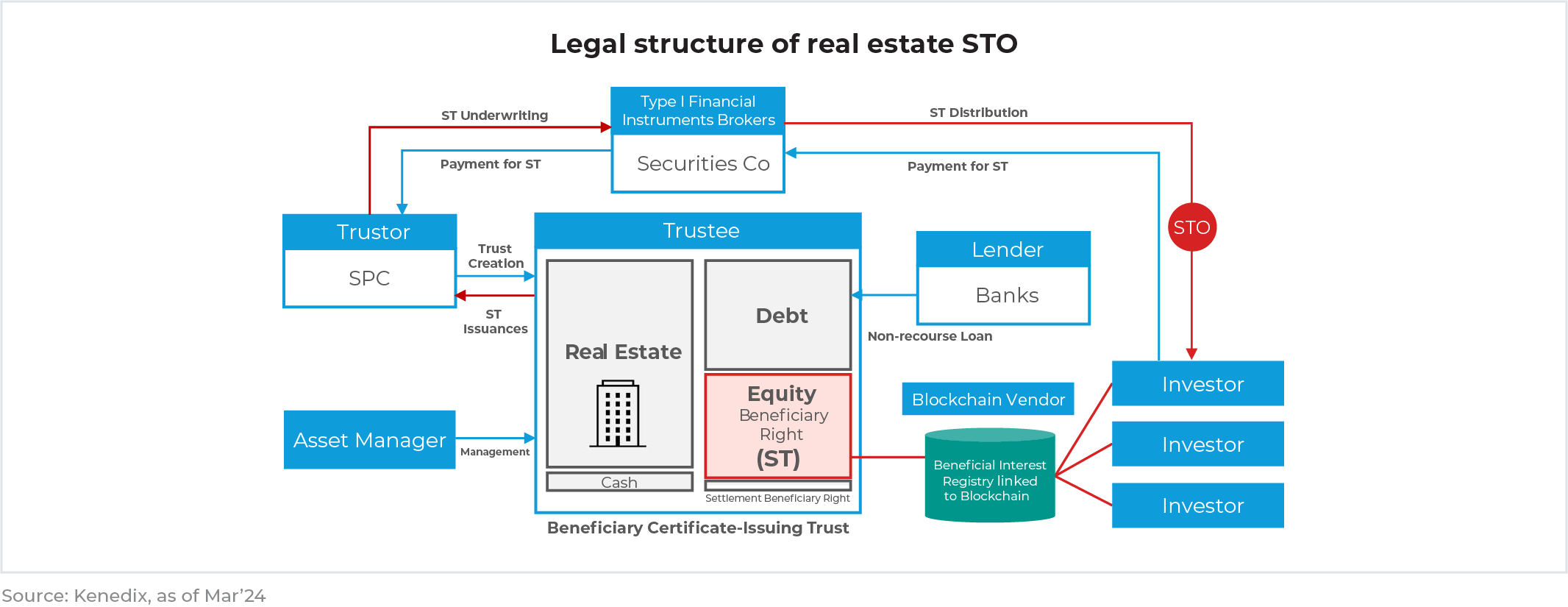
In simpler terms, what all this means for an investor is that when you buy a Japanese real estate token, you are usually buying a share of a trust that owns the property, rather than the property directly. This setup keeps the ownership fragmented but organized under a legal entity, and it simplifies compliance with existing laws. Importantly, it also ensures that token holders have a claim on the property’s income or value (e.g. rental income, or proceeds if the property is sold), similar to how shareholders have claims in a company.
Thanks to the clear framework, major Japanese financial institutions have jumped on board to provide the needed technology and platforms. Two blockchain platforms dominate the real estate token market in Japan: Progmat and ibet for Fin. Progmat is a tokenization platform spearheaded by Mitsubishi UFJ Trust and Banking, and ibet for Fin is a consortium-led platform initially developed by BOOSTRY (a Nomura-led venture). Together, these two platforms facilitated over 90% of Japan’s security token issuances, effectively forming the backbone for most deals. They provide the tools to issue tokens, handle investor onboarding (KYC/AML checks), manage contracts, and keep records – all in compliance with regulations. The ibet for Fin network, for instance, is jointly operated by 18 major financial institutions in Japan to ensure no single player controls it. This collaborative approach shows how traditional banks, brokerages, and trust companies in Japan are actively involved in the tokenization trend, rather than leaving it purely to tech startups.
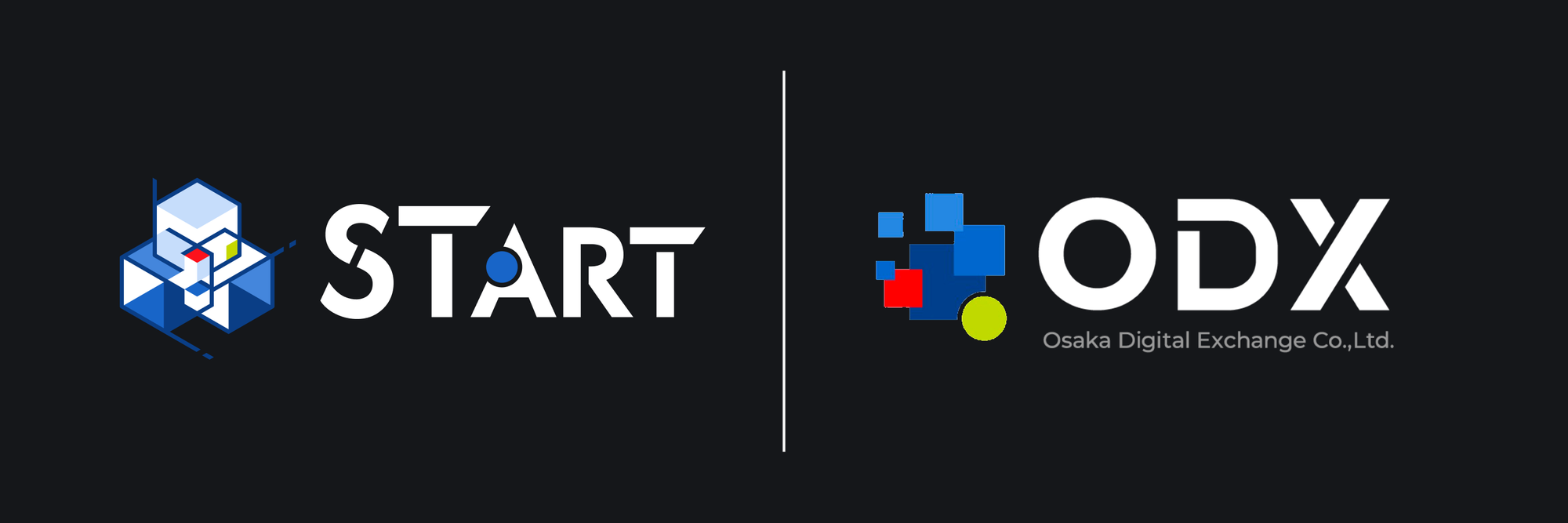
Another key piece of infrastructure is the emergence of secondary trading platforms for tokenized securities. In December 2023, the Osaka Digital Exchange (ODX) launched Japan’s first proprietary trading system for security tokens. ODX’s “START” market provides a regulated venue where investors can buy and sell tokenized securities (like real estate tokens) beyond the initial offering. ODX is backed by some of Japan’s largest financial firms – it’s majority-owned by SBI Holdings, and other stakeholders include Sumitomo Mitsui, Nomura, and Daiwa Securities. Having a secondary market is important: it means token investors aren’t locked in indefinitely – they might be able to trade their real estate tokens more like stocks, improving liquidity. While still new, the trading infrastructure is growing, and more platforms are likely to connect in the future (including potential links to international exchanges).
Major Players Leading the Charge
Japan is rapidly emerging as a global leader in the tokenization of real estate, with major financial institutions, blockchain platforms, and tech-forward real estate firms driving innovation. From megabanks leveraging blockchain to streamline billion-dollar transactions, to startups simplifying access for foreign investors — the ecosystem is evolving fast. Below, we highlight the key players shaping Japan’s digital property revolution.
MUFG Bank: Banking Giant Goes Blockchain

Japan's largest bank, Mitsubishi UFJ Financial Group (MUFG), has become the most aggressive institutional player in real estate tokenization. The bank acquired a ¥100 billion Osaka skyscraper specifically for conversion into digital tokens. Through its Progmat platform, MUFG offers both institutional and retail investors access to tokenized real estate.
MUFG's approach shows institutional confidence in tokenization technology. The bank uses blockchain to handle compliance and streamline transactions, reducing traditional barriers to real estate investment. By targeting both domestic and foreign real estate, MUFG is creating a global platform for property tokenization.
GATES Inc.: Opening Japan to the World

GATES Inc., a Tokyo-based real estate firm, represents the entrepreneurial side of Japan's tokenization movement. The company partnered with gaming blockchain Oasys to tokenize $75 million of prime Tokyo properties. GATES plans to expand this model to $200 billion worth of assets, making Japanese real estate accessible to global investors.
What sets GATES apart is its focus on foreign investors. The company specifically designed its tokenization platform to eliminate language barriers and reduce legal complexity for overseas buyers. This approach could fundamentally change how international investors access Japan's property market.
Kenedix: The Tokenization Pioneer
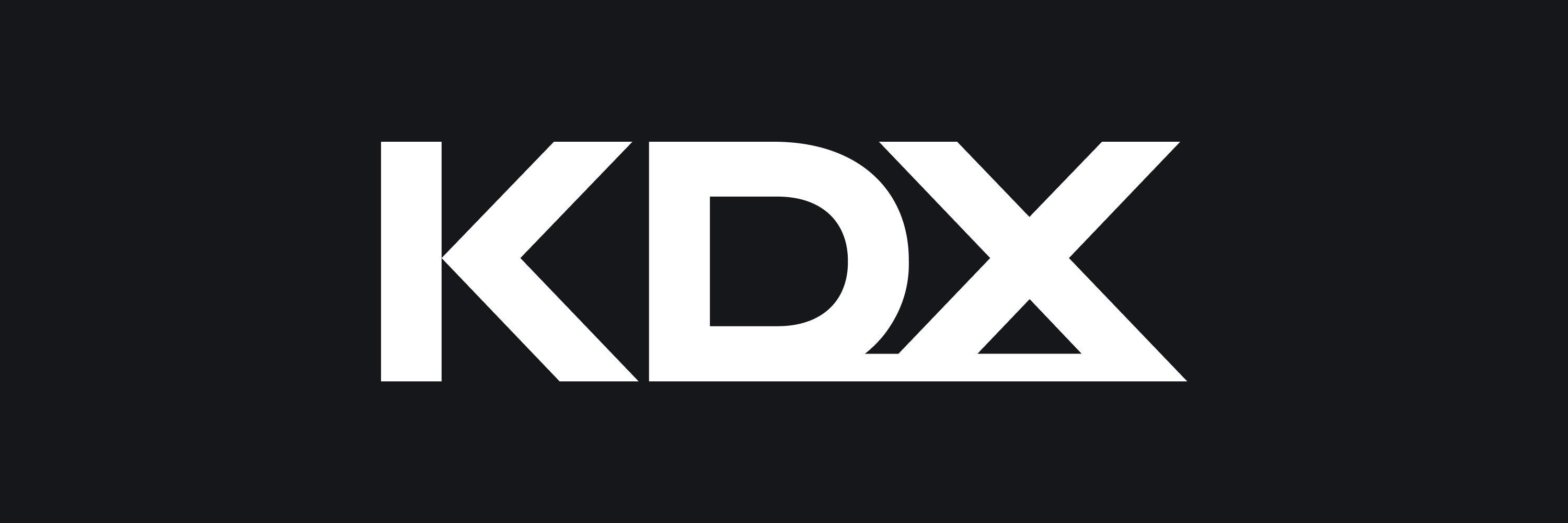
Kenedix deserves credit as Japan's tokenization pioneer, completing the country's first real estate Security Token Offering (STO) in August 2021. The company has since completed 12 real estate tokenization projects, building expertise in everything from office buildings to rental houses.
Kenedix's latest project tokenized 462 rental homes in the greater Tokyo area, showing how blockchain can handle residential property portfolios. The company aims to achieve ¥2.5 trillion worth of tokenized real estate across Japan by 2030, a target that would represent significant market penetration.
Technology Platforms: The Infrastructure Behind Tokenization
Behind the rapid adoption of real estate tokenization in Japan lies a robust and evolving technological foundation. Specialized platforms and digital exchanges are emerging to meet the complex demands of compliance, security, and liquidity — turning bold institutional strategies into operational reality. From banking-grade systems to gaming-native blockchains, Japan is assembling a diverse tech stack that supports large-scale, secure, and accessible tokenized asset markets. Here's a closer look at the platforms powering this transformation.
Progmat: The Banking Platform
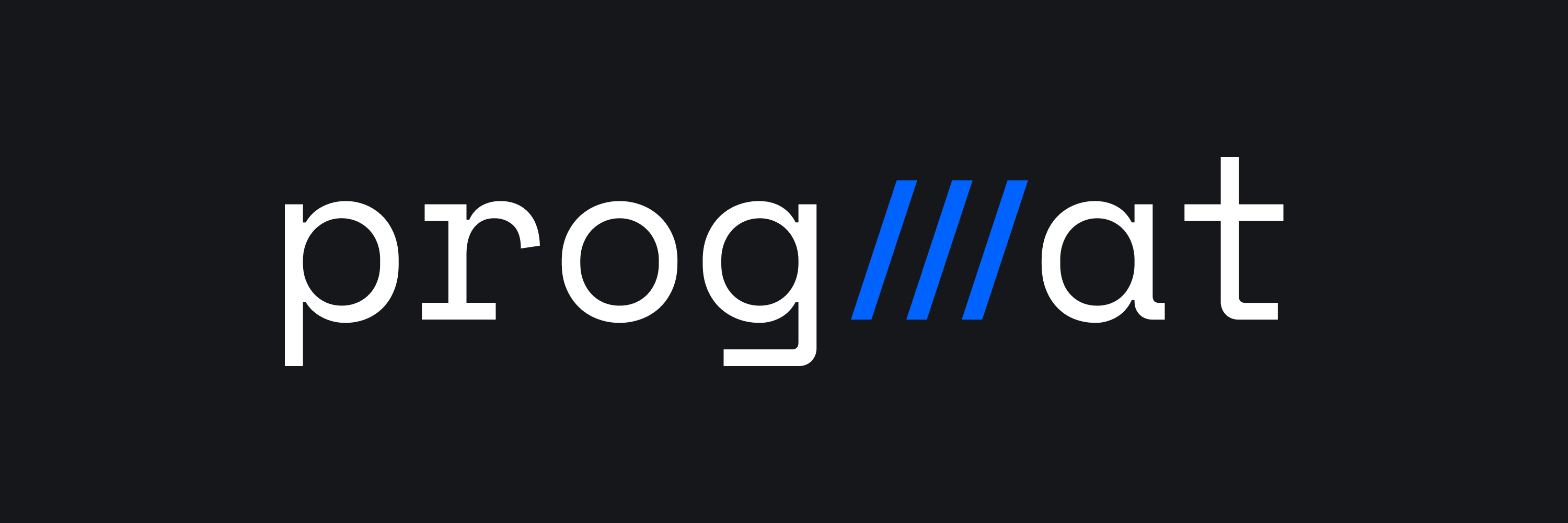
Progmat, originally founded by MUFG, has become Japan's leading platform for institutional tokenization. The platform handles everything from token issuance to secondary trading, providing end-to-end infrastructure for financial institutions. Progmat's success reflects its focus on compliance and security. The platform integrates with traditional banking systems while providing blockchain functionality. With backing from Japan's major banks and expansion funding from real estate firms, Progmat is positioned to handle large-scale tokenization projects.
Oasys: Gaming Blockchain Enters Real Estate

Oasys represents an interesting convergence between gaming and real estate tokenization. Originally built for blockchain gaming, Oasys is now powering major real estate projects like GATES's Tokyo tokenization. The platform's Ethereum compatibility makes it accessible to global investors.
BOOSTRY and ibet for Fin

BOOSTRY's ibet for Fin platform has captured significant market share in Japan's tokenization market. The consortium blockchain platform handles complex multi-party transactions, making it suitable for large real estate deals. Companies like Kenedix use ibet for Fin to manage securities information and transaction records.
The Osaka Digital Exchange: Creating Secondary Markets

The Osaka Digital Exchange (ODX) launched START, Japan's first regulated secondary market for security tokens, in December 2023. This platform addresses a critical need in tokenization—providing liquidity for digital assets after initial issuance.
START began with real estate tokens but plans to expand into other asset classes. The exchange is backed by major financial institutions including SBI Holdings, Nomura, and SMBC. While trading volumes remain modest, START provides essential infrastructure for Japan's tokenization ecosystem.
Together, these platforms form the backbone of Japan’s emerging tokenized real estate ecosystem. From issuance to secondary trading, and from institutional-grade compliance to global investor accessibility, each layer of the infrastructure addresses a key challenge in bringing real-world assets onto the blockchain. While the market is still maturing, Japan is clearly laying the groundwork for a scalable, secure, and liquid environment in which tokenized real estate can thrive. As adoption grows and interoperability between platforms strengthens, Japan’s model could serve as a blueprint for other nations exploring the future of real estate and digital finance.
Benefits and Ongoing Challenges
Japan’s early foray into real estate tokenization highlights several benefits of this approach:
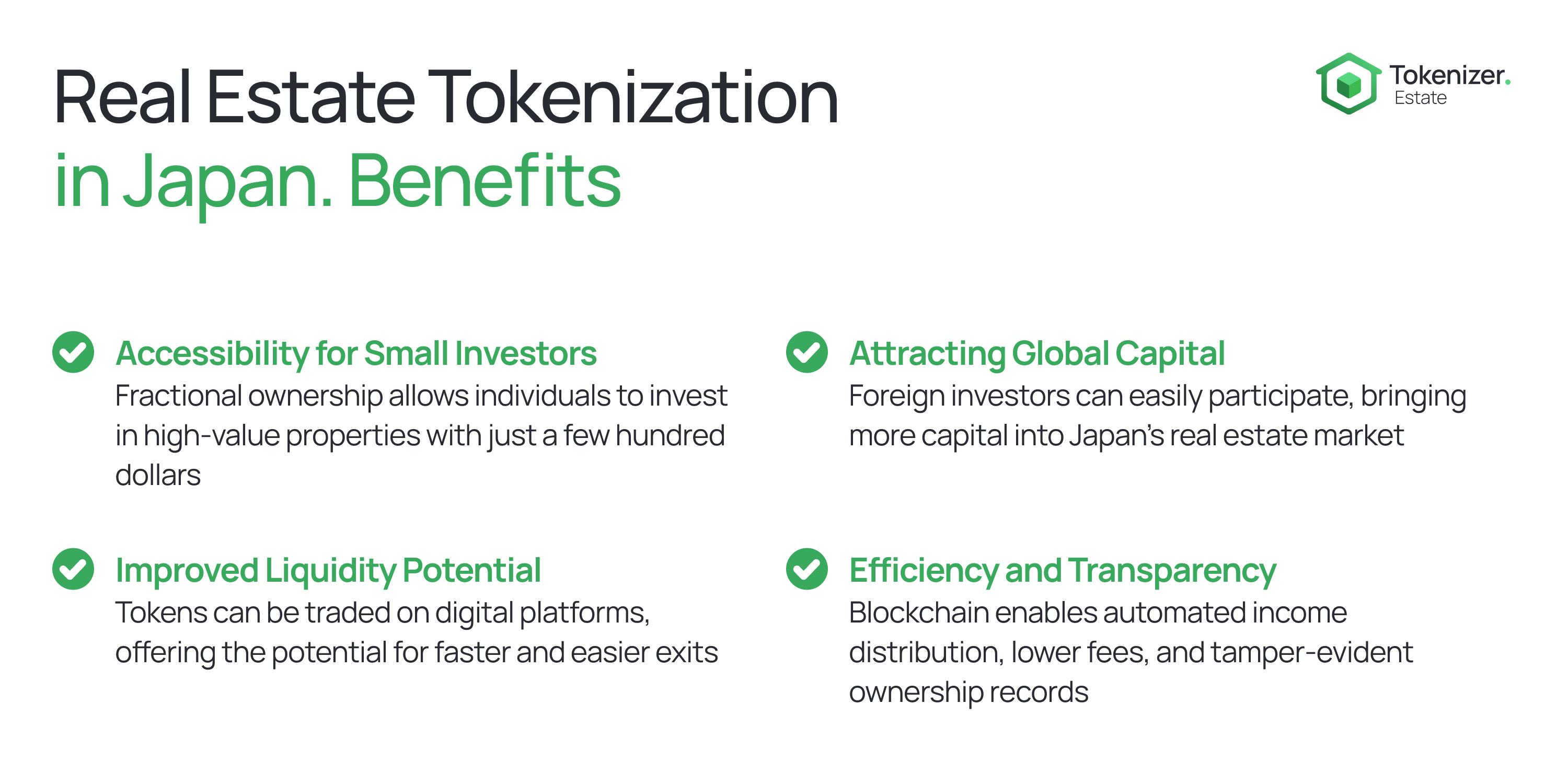
Accessibility for Small Investors:
Perhaps the biggest change is opening up investment opportunities to regular people. Through tokenization, small investors can buy fractions of high-value properties instead of needing to buy whole buildings or invest large sums. For example, the minimum investment in some tokenized offerings can be just a few hundred or thousand dollars, putting assets like Tokyo apartments within reach of middle-class investors. This democratization of real estate is turning property into a more inclusive asset class.
Attracting Global Capital:
Tokenized platforms allow foreign investors to participate easily, which brings more capital into Japan. A digital token can be traded internationally without the usual friction, so a buyer in Singapore or Europe could invest in a Japanese tokenized property deal online. By reducing legal and logistical hurdles for foreigners, Japan can draw interest from abroad, potentially supporting property values and development funding.
Improved Liquidity Potential:
Traditional real estate is famously illiquid – selling a property can take months and involves brokers, escrow, and hefty fees. Tokenization promises a more liquid market. Tokenized real estate can be traded 24/7 on digital exchanges, a bit like stocks. Investors might not have to wait for years to cash out; they could potentially sell their tokens at any time to someone else if there’s demand. This flexibility is appealing, especially to investors who might otherwise hesitate to tie up money in property for a long period. It’s important to note that liquidity is not automatic – it depends on active buyers and sellers – but the infrastructure is being put in place.
Efficiency and Transparency:
Using blockchain can streamline processes. Smart contracts (self-executing code on blockchain) can automate distribution of rental income or dividends to token holders, cutting down administrative work. Ownership records on a blockchain are tamper-evident and transparent, which can reduce fraud and simplify audits. Also, fewer middlemen (no need for as many brokers or lawyers in each small transaction) means potentially lower fees for investors and issuers. In one case, tokenization removed the need for broker intermediaries by letting an asset manager directly connect with investors online.
While the outlook is promising, there are still challenges to overcome:
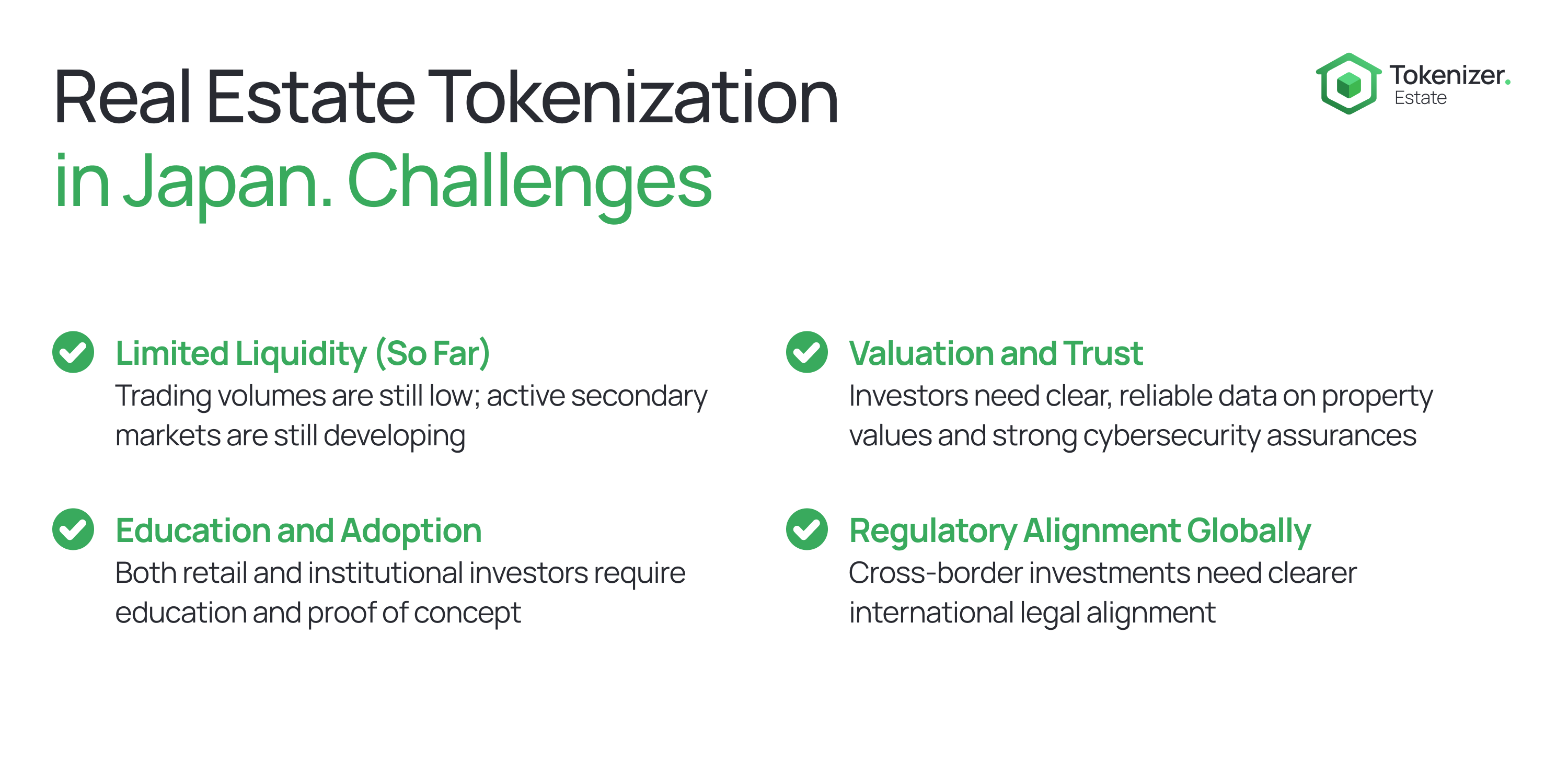
Limited Liquidity (So Far):
Ironically, while tokenization is meant to improve liquidity, the reality today is that many real estate tokens still have low trading volumes. The secondary markets are still in their infancy, with only a few platforms where tokens can be traded and relatively few active participants. This means an investor might own tokens but find it hard to sell them quickly at a fair price until the market matures. Japan’s efforts like the ODX exchange are addressing this, but building a vibrant marketplace will take time and trust.
Valuation and Trust:
Investors need confidence in how the underlying real estate is valued. Traditional real estate has appraisal reports and market comparables; tokenized deals need to provide similar transparency. There’s a risk that investors may not fully understand what they’re buying if disclosures are not clear. So far, Japanese offerings have been quite transparent (often backed by known firms with proper prospectuses), but maintaining high standards is crucial. Additionally, since tokens are a new format, some investors might be cautious, worrying about things like cybersecurity or the permanence of digital records.
Education and Adoption:
For many, tokenized real estate is a new concept. It requires some education – both for the public and within organizations. Institutional investors might hesitate due to concerns about regulatory compliance in other jurisdictions, or simply because it’s a new technology. Building familiarity and trust will involve continued successful case studies. The more examples of tokens working smoothly (paying income on time, appreciating in value, being easily tradable), the more confidence will grow.
Regulatory Alignment Globally:
Japan can have great local rules, but if foreign investors want to come in, those investors’ home countries also need to be okay with tokenized securities. Harmonizing regulations or at least clarifying how a Japanese token is treated in, say, the U.S. or EU, will be important for truly international investment. This is more of a long-term issue, but as Japan leads the way, it may help influence global standards or bilateral agreements for recognizing digital securities.
Despite these challenges, the trajectory in Japan is clearly toward expanding the tokenized real estate market. Each successful project adds credibility and improves the playbook for the next one. Moreover, the involvement of big-name companies and government entities in Japan gives the sector a legitimacy that few other countries’ tokenization efforts have achieved so far.
Conclusion: A New Era for Property Investment

Japan’s experience with real estate tokenization so far shows that this concept is moving from hype to reality. What began around 2021 with small pilot projects has evolved into a growing industry with established financial institutions, government support, and real investors – both big and small – participating. By adapting its regulatory environment and leveraging blockchain technology, Japan has made it possible to invest in property in a more accessible and digital way. A $20 trillion market that was once seen as a closed shop for outsiders is gradually opening up. Token by token, buying real estate is starting to resemble buying other financial assets, which could ultimately make the market more efficient and liquid.
It’s important to emphasize that Japan’s approach is about integration, not disruption for its own sake. The tokenization movement here is happening with the blessing of regulators, the involvement of traditional banks and asset managers, and the interest of everyday citizens. This collaborative, mainstream approach may be why Japan is emerging as a leader in tokenized real estate, serving as an example for other countries. Observers note that Japan’s well-developed framework and ecosystem could pave the way for other markets to follow suit in coming years, as they see the practical benefits and workable models demonstrated.
For investors and real estate professionals, Japan’s tokenization trend offers valuable lessons. It shows that with the right legal structure and technology, real estate can be made more divisible, tradeable, and globally accessible without sacrificing investor protection. We are still in the early days – challenges like ensuring liquidity and building investor trust remain. However, the progress in Japan suggests that tokenization is not just a buzzword but a functional innovation. From a tech perspective, it marries blockchain with one of the most tangible assets – land and buildings. From a market perspective, it introduces new flexibility into an old industry.
In summary, real estate tokenization in Japan has shifted into a higher gear. It’s an exciting development for anyone watching the intersection of property and finance. By transforming how people can invest in real estate, Japan is not only modernizing its own market but also contributing to a global evolution in real estate investment. The story is still unfolding, but one thing is clear: the way we think about owning and investing in property may never be the same, and Japan is at the forefront of this change. As the Japanese proverb goes, “起死回生” (kishi kaisei) – out of an old, constrained system, a new life is being reborn in the form of digital real estate assets. Japan’s journey in this space will be worth following, as it could very well define the next generation of real estate investing.

